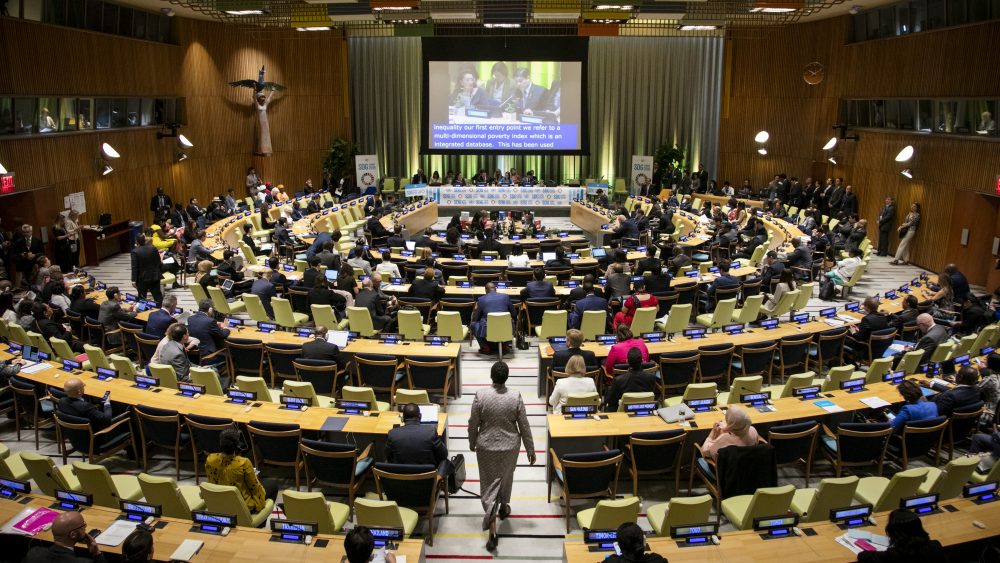Posted on 23 October 2019 by Christie Nicoson
The views expressed in this publication are those of the authors and do not necessarily represent those of the Agenda 2030 Graduate School or Lund University. The present document is being issued without formal editing.
In the last few weeks, news headlines and the world’s attention has been attuned to climate marches and speeches. This climate movement was part of a larger discussion about sustainability – a review of the 2030 Agenda on Sustainable Development, encompassing a global effort to address economic, social, and environmental challenges.
A progress update for sustainability
The events centred around the United Nations High Level Political Forum (HLPF), which took place on September 24-25th at UN Headquarters in New York. Government, civil society, business, international organisation, and youth leaders assembled to review progress of the 2030 Agenda and the 17 Sustainable Development Goals (SDGs).
Leading up to the HLPF, an independent report commissioned by UN member states painted a drastic picture. The report finds that not only is the current development model unsustainable, but that we are in danger of reversing two decades of progress. Increasing inequalities, climate change, biodiversity loss, and increasing waste from human activities point to “dramatic changes… in ways that are irreversible on time scales meaningful for society.” In no uncertain terms, the report states that we are moving in the wrong direction.
Against the backdrop of this report, the HLPF unfolded with two days of Leaders Dialogues around what was framed as a “decade of action” needed to achieve the SDGs. However, rather than presenting targeted and action-oriented remarks, world leaders made largely generalised and sometimes “meandering” statements. At the opening session, states adopted a political declaration, “Gearing up for a decade of action and delivery for sustainable development”. The declaration affirms priorities already existing in the 2030 Agenda, stopping short of bold or novel commitments that might spur such action or delivery. In parallel to the Forum, a rich array of events highlighted a wide diversity of topics related to the 17 SDGs, including the Global Week to Act. In the days since the Forum, states and other stakeholders have continued to pledge voluntary acceleration actions. Although as individual components, these events and incoming commitments may help deliver on development promises, taken together some challenges remain. In some cases, these efforts do little to move development beyond business as usual. They also make visible the greater need to move beyond siloed or individual actions, towards concerted systemic change.
A need for systemic change
Of the many discussions held at the Forum and the expected outcomes, perhaps one of the greatest take-aways is that of persistent gaps – a gap between progress made and that which is needed to achieve the goals, a gap between what urgency of scientific consensus and insufficient statements and commitments made by world leaders – and an echoed call for transformative system changes.
In a recent commentary, a group of scientists urged for achievement of our global sustainability mission through global transformations that reach across sectors and engage governments, economy and finance, individual and collective action, and technology and science. This kind of systemic change may seem daunting. But alongside making grand critique and calls to action, scientists in the 2030 report and elsewhere have outlined how these changes might be realised. Not least of these is the need for an expansion of sustainability science: cross-disciplinary research that highlights how systems interact. One example is Lund University’s Agenda 2030 Graduate School. The School funds doctoral students across university-wide faculties – medicine, law, social science, humanities and theology, science, engineering, fine and performing arts, and economics and management. These students work on projects connected to the Goals and, rather than focusing on individual Goals, they aim to adopt the Agenda’s holistic approach and take steps toward realising the potential of multidisciplinary research.
The strong interest in the climate movement in recent media cycles is extremely important, as the time to act is now. To be sure, each of the 17 Goals and the indicators they encompass are critical in and of themselves. However, in order to achieve development that is truly sustainable economically, socially, and environmentally, we need to look beyond any one issue. We need to approach the Sustainable Development Goals as a whole and create systemic change by moving meaningfully toward multidisciplinary research, policy, and action.
—
This blog post is based on discussions from a seminar hosted by Lund University’s Agenda 2030 Graduate School.
Christie Nicoson is a PhD candidate within the Agenda 2030 Graduate School and in the Department of Political Science at Lund University.

